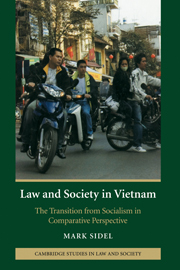Book contents
- Frontmatter
- Contents
- List of tables
- Acknowledgements
- Introduction
- Chapter 1 Constitutionalism and the emergence of constitutional dialogue in Vietnam
- Chapter 2 The emerging debate over constitutional review and enforcement in Vietnam
- Chapter 3 Motorbike constitutionalism: The emergence of constitutional claims in Vietnam
- Chapter 4 Economic law in the service of globalization: Labor law and labor export from Vietnam
- Chapter 5 Law, the press, and police murder: The trial of Lt. Nguyen Tung Duong
- Chapter 6 Law and the regulation of civil society: Nonprofit organizations, philanthropy, grassroots organizations, and the state
- Chapter 7 Testing the limits of advocacy: The emergence of public interest law in Vietnam
- Chapter 8 Donors, law and social justice in Vietnam: The uncertain promise
- Bibliography
- Index
Chapter 6 - Law and the regulation of civil society: Nonprofit organizations, philanthropy, grassroots organizations, and the state
Published online by Cambridge University Press: 07 July 2009
- Frontmatter
- Contents
- List of tables
- Acknowledgements
- Introduction
- Chapter 1 Constitutionalism and the emergence of constitutional dialogue in Vietnam
- Chapter 2 The emerging debate over constitutional review and enforcement in Vietnam
- Chapter 3 Motorbike constitutionalism: The emergence of constitutional claims in Vietnam
- Chapter 4 Economic law in the service of globalization: Labor law and labor export from Vietnam
- Chapter 5 Law, the press, and police murder: The trial of Lt. Nguyen Tung Duong
- Chapter 6 Law and the regulation of civil society: Nonprofit organizations, philanthropy, grassroots organizations, and the state
- Chapter 7 Testing the limits of advocacy: The emergence of public interest law in Vietnam
- Chapter 8 Donors, law and social justice in Vietnam: The uncertain promise
- Bibliography
- Index
Summary
The key principles underlying the post-1986 reform of Vietnamese law and the legal system include a strong role for the state and an instrumentalist concept of law as serving state interests and priorities, and a notion of rights as state-granted rather than emanating from concepts of natural rights. State attitudes toward citizen-initiated social activity, expressed through law and political policy, have ranged from repressive to ambivalent in the past to sometimes encouraging today in certain arenas. The state and Party's regulation of the emerging Vietnamese nonprofit and voluntary sector illustrates these issues at work, and how state and Party responses have changed in the nearly twenty years since the doi moi process began.
In recent years, Vietnam's emerging and diversifying voluntary sector, including a wide range of organizations that are closely related to or dominated by the Party or state, has expanded rapidly to fulfill social needs from which the Vietnamese state is retreating and to play other roles in Vietnamese society. The emerging voluntary sector, broadly defined, now includes Party-related mass organizations, business, trade and professional associations, policy research groups, social activist and social service groups, religious groups, clans, charities, private and semiprivate universities, social and charitable funds, and other institutions.
The state has sought to encourage the growth of social organizations, at least partly to compensate for the inability of the state to keep pace with social needs in the reform period.
- Type
- Chapter
- Information
- Law and Society in VietnamThe Transition from Socialism in Comparative Perspective, pp. 141 - 165Publisher: Cambridge University PressPrint publication year: 2008



